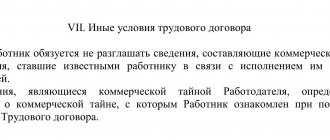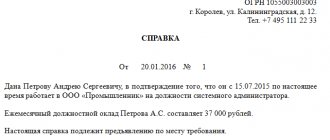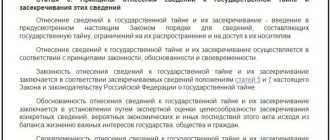Official secrets do not include information of a special nature. We will tell you in our material which regulatory act defines their composition and how their openness is ensured.
What information constitutes an official secret (definition and characteristics)
List of information constituting official secrets
Information to which access cannot be restricted
Ways to ensure openness of proprietary information
Results
What information constitutes an official secret (definition and characteristics)
Information constituting official secrets (SSTS ) is information:
- received by government employees while performing their duties;
- the distribution of which is limited by law.
Clause 3 of the List of Confidential Information (approved by Decree of the President of the Russian Federation dated March 6, 1997 No. 188) provides characteristics of information classified as official secrets:
- access to it is limited to government agencies;
- the restriction is made in accordance with the legislation of the Russian Federation.
Below are examples of information with limited access by law that civil servants may have due to the performance of their duties:
What other information may be included in the CCTS, read on.
Official secrets from the point of view of the law
Until January 1, 2008, the concept of official secrets was reflected in Part 1 of Art. 139 of the Civil Code of the Russian Federation and meant information that has both actual and potential value, is in limited access and requires confidentiality. Moreover, according to the norm, commercial secrets also met these same conditions.
Today, a relatively precise definition of official secret is present in clause 3 of the List of confidential information, approved by Decree of the President of the Russian Federation of March 6, 1997 No. 188: information constituting official information, access to which is limited by government authorities in accordance with federal legislation.
The more narrow concept of “official secret” is not disclosed anywhere. However, many laws, as well as by-laws and departmental regulations contain rules on the inadmissibility of its distribution.
For example, Art. 17 of the Law “On Credit Histories” dated December 30, 2004 No. 218-FZ prohibits officials of the Bank of Russia from making public or otherwise disseminating information that constitutes commercial, banking, tax and official secrets.
List of information constituting official secrets
There is currently no legally approved list of SSTS, although a number of similar lists of information have been approved (for example):
- constituting a state secret (approved by Decree of the President of the Russian Federation of November 30, 1995 No. 1203);
- confidential (approved by Presidential Decree dated March 6, 1997 No. 188);
- subject to classification (letter of the Ministry of Economic Development of the Russian Federation dated June 29, 2015 No. D23I-3004).
The SSTS List may include any confidential information that:
- relates to government work. or municipal authorities (placed in documents under the heading “For official use”);
- became known to civil servants in the performance of their duties.
For example, the SSTS category includes information about the adoption of a child - in accordance with Art. 139 of the Family Code of the Russian Federation, this information is protected by law and is not subject to disclosure:
- officials who carried out state registration of adoption;
- judges who made the adoption decision;
- persons otherwise knowledgeable about the adoption.
In the absence of a legally approved “official” list, there is a set of information that cannot be classified as an official secret. We'll talk about them further.
You can familiarize yourself with the various lists used by taxpayers in their work from the materials posted on our portal:
- “List of direct income tax expenses”;
- “List of property taxed at cadastral value”.
Responsibility for disclosing official secrets
Since official secrets are classified as confidential information, an official may be brought to administrative liability for its disclosure under Art. 13.14 Code of Administrative Offences. For this act, a fine of 4,000 - 5,000 rubles is provided.
Protection of official secrets is also carried out within the framework of the Criminal Code. For example, 155th Art. The Criminal Code establishes liability for disclosure of the secret of adoption by an official. He may, incl. face a fine of up to 80,000 rubles, arrest for up to 4 months, correctional labor for up to 1 year.
Information to which access cannot be restricted
Information that is not classified as an official secret is listed in clause 1.3 of Decree of the Government of the Russian Federation dated November 3, 1994 No. 1233 (on the procedure for handling official information of limited distribution).
Restricted official information does not include:
1. Legislative acts establishing:
- legal status of government agencies, organizations, public associations;
- rights, freedoms, duties of citizens and the procedure for their implementation.
2. Information about dangerous natural phenomena and processes, emergency situations.
3. Sanitary-epidemiological, hydrogeological, hydrometeorological, environmental information.
4. Description of the functions, directions and forms of activity of the executive authority, as well as its structure and address.
5. The procedure for considering applications and appeals from citizens and legal entities, as well as decisions made.
6. Information on the use of government resources, the state of the economy and the needs of the population.
7. Documents necessary for the implementation of the rights, freedoms and responsibilities of citizens, accumulated in open funds of archives and libraries, information systems of organizations.
A similar list of information, access to which cannot be restricted, is given in Art. 8 of the Law on Information dated July 27, 2006 No. 149-FZ.
What restrictions taxpayers may encounter - see the materials:
- “The Federal Tax Service spoke about restrictions on withholding personal income tax”;
- “The accounting period for income tax losses is limited to 10 years.”.
General information
Types of secrets
Secrets are divided into the following types:
- state;
- official;
- a commercial;
- personal.
The concept of official secrets
There is no clear definition of this concept by law. But the essence and signs of classifying information as an official secret can be identified by analyzing regulations.
Official secrets are data to which access is prohibited by special authorities and/or federal laws. It is prohibited from being disclosed unless the information is requested by the competent authorities.
Also interesting is the difference between commercial and official secrets. According to the decree of the President of Russia, a trade secret is data that is related to commercial work, and an official secret is that information to which access is denied by government authorities.
Also, resolution number 1233 clarifies the system for handling official data. With the help of this document, all questions arising regarding official data are resolved, and the essence of the confidentiality stamp “For official needs” is also explained.
The regulation states that data that has a limited period of use is unclassified. However, information relating to the work of the company may not be disclosed if there is a business need for it. This document instructs the heads of executive power to appoint officials who will identify proprietary information as restricted distribution and protect it. This means that all employees who belong to state bodies of legislative, executive, judicial power and structures subordinate to them can have official secrets.
Each company has a defined procedure for achieving goals and objectives, has its own reporting system, document control, and so on. Information of this kind is called an official secret. The volumes of such data are determined by managers.
https://youtu.be/VOCekwzWDxM
Official secret of registry office acts
Data received by civil registry office employees is also confidential. Access to this information should be limited to only those employees who are authorized to do so. Civil status information should not be disclosed. Such information includes birth, change of surname, name, adoption, marriage, divorce.
REFERENCE! The management of the registry office has the right to provide such information only at the request of investigative or inquiry authorities, the prosecutor's office, and the court.
It becomes clear that the secrecy of the recording can also be classified as an official secret. In general, almost all information and documents can be attributed to this concept. In fact, not a single document of any company should be accessible to outsiders.
Protection of official secrets
The concepts of official secrets and proprietary information are very close. These include all confidential information circulating in government agencies. But this should also apply to commercial organizations. They also work with a huge number of documents. They constitute an official secret, which is also not subject to disclosure.
Structures classified as non-state should develop their own provisions regarding this concept. Usually, for this purpose, a document is issued that lists documents labeled “For official use only.” In addition, individual units may have their own regulations, because they all have access to official secrets in various areas. All this can be summarized into a single list for the enterprise. This is how the protection of official secrets is organized.
REFERENCE! The confidentiality stamp is used in many countries. For example, in the United States, any commercial information that comes to a person during his work is classified as secret.
Documents classified as “official secrets”:
— legislative acts regarding the legal status of the state. structures, rights and property of citizens of the country, public associations.
— information about emergency situations, natural phenomena, dangerous environmental processes, epidemiological situation.
— structure of executive authorities, their directions, functions, forms of implementation of activities.
— the order of consideration of submitted documents.
— implementation of decisions on submitted documents.
— data on the budget and economic condition, use of government resources.
— papers accumulating in archives and information networks of enterprises.
Some experts are puzzled by the fact that the concept of state and official secrets includes information that can be used to find out about violations of the law by representatives of government agencies. It is these omissions that give officials the opportunity to completely limit access to data from internal investigations and other shortcomings.
The openness of this issue could be the main incentive for the good work of the authorities. It follows from the Regulations that the leadership of the executive branch establishes a category of officials who are authorized to designate documents or information as classified as restricted distribution. This ensures the protection of this information.
Ways to ensure openness of proprietary information
Official information that is not classified as an official secret must be available to all interested users of such information.
Availability of information is ensured in the following ways:
- publications in the media - the texts of adopted laws and regulations, information about government procurement, decisions of the Constitutional Court are posted;
- posting on the Internet information about target programs, international cooperation, statistical and other information, the posting of which is required by law;
- posting online general information about courts (name, organizational structure, powers, etc.), judicial statistics, court staffing, files of arbitration cases;
- placement of stands in the premises occupied by government agencies about their activities (operating procedures, algorithms for obtaining information);
- through open access to archival documents, originals and (or) copies from archival funds and libraries;
- the opportunity to exercise the right (in a regulated manner) to attend meetings of collegial authorities (government, State Duma, etc.) and open court hearings for journalists, representatives of legal entities, government agencies and ordinary citizens;
- provision by government agencies of responses to requests from any person or organization.
You can familiarize yourself with various types of requests on our portal:
- “We are preparing a request to the Social Insurance Fund about the status of settlements - sample”;
- “The Federal Tax Service recommends inspectors to submit inquiries to banks with revoked licenses”.
Legal regime of commercial, official and other secrets protected by law
Legal regime of commercial, official and other secrets protected by law. Questions for discussion: 1. Legal regime of trade secrets. 2. Legal regime of official secrets. 3. Legal regime of professional secrecy. 4. Legal regime of bank secrecy. 5. Legal regime of tax secrecy. 6. Personal data. Topics of abstracts and reports: 1. Well-known legal disputes regarding trade secrets. 2. Medical confidentiality. Legislation and practice.
№1)
Art. 3 of the Federal Law of July 29, 2004 N 98-FZ “On Trade Secrets” determines that a trade secret is understood as a regime of confidentiality of information that allows its owner, under existing or possible circumstances, to increase income, avoid unjustified expenses, maintain a position in the goods market, works, services or receive other commercial benefits.Information constituting a trade secret (production secret) - information of any nature (production, technical, economic, organizational and others), including the results of intellectual activity in the scientific and technical field, as well as information about the methods of carrying out professional activities that have actual or potential commercial value due to their unknownness to third parties, to which third parties do not have free access legally and in respect of which the owner of such information has introduced a trade secret regime.
The right to classify information as information constituting a trade secret and to determine the list and composition of such information belongs to the owner of such information.
The trade secret regime forms a set of legal, organizational, technical and other measures to protect its confidentiality.
The purpose of the trade secret regime is to protect the right to fair competition and the use of one's intellectual abilities.
The legal regime of trade secrets is determined by the rules establishing:
- procedure for documenting information;
- ownership of individual documents and individual arrays of documents, documents and arrays of documents in information systems;
- categorizing information according to the level of access to it;
- procedure for legal protection of information constituting a trade secret.
The trade secret regime is considered established after the owner of the information constituting a trade secret takes the following measures:
- determining the list of information constituting a trade secret;
- limiting access to information constituting a trade secret by establishing a procedure for handling this information and monitoring compliance with such a procedure;
- accounting for persons who gained access to information constituting a trade secret and (or) persons to whom such information was provided or transferred;
- regulation of relations regarding the use of information constituting a trade secret by employees on the basis of employment contracts and contractors on the basis of civil law contracts;
- applying to tangible media containing information constituting a trade secret, or including in the details of documents containing such information the stamp “Trade Secret” indicating the owner of such information (for legal entities - full name and location, for individual entrepreneurs - surname, name, patronymic of a citizen who is an individual entrepreneur, and place of residence).
Measures to protect the confidentiality of information are considered reasonably sufficient if:
- access to information constituting a trade secret by any persons without the consent of its owner is excluded;
- ensures the possibility of using information constituting a trade secret by employees and transferring it to contractors without violating the trade secret regime.
Information constituting a trade secret, the owner of which is another person, is considered to have been obtained illegally if it was obtained with deliberate overcoming of the measures taken by the owner of the information constituting a trade secret to protect the confidentiality of this information, and also if the person receiving this information knew or had sufficient grounds believe that this information constitutes a trade secret owned by another person, and that the person transmitting this information does not have a legal basis for transmitting this information.
A trade secret regime cannot be established by persons engaged in business activities in relation to the following information (Article 5 of the law):
- contained in the constituent documents of a legal entity, documents confirming the fact of making entries about legal entities and individual entrepreneurs in the relevant state registers;
- contained in documents giving the right to carry out entrepreneurial activities;
- on the composition of the property of a state or municipal unitary enterprise, state institution and on their use of funds from the corresponding budgets;
- about environmental pollution, the state of fire safety, the sanitary-epidemiological and radiation situation, food safety and other factors that have a negative impact on ensuring the safe operation of production facilities, the safety of each citizen and the safety of the population as a whole;
- on the number, composition of employees, the remuneration system, working conditions, including labor protection, indicators of industrial injuries and occupational morbidity, and the availability of vacancies;
- about the debt of employers in payment of wages and other social benefits;
- about violations of the legislation of the Russian Federation and facts of prosecution for committing these violations;
- on the conditions of competitions or auctions for the privatization of state or municipal property;
- on the size and structure of income of non-profit organizations, on the size and composition of their property, on their expenses, on the number and remuneration of their employees, on the use of gratuitous labor of citizens in the activities of a non-profit organization;
- on the list of persons who have the right to act without a power of attorney on behalf of a legal entity;
- the mandatory disclosure of which or the inadmissibility of restricting access to which is established by other federal laws.
The holder of information constituting a trade secret, as well as government bodies that have received such information, are obliged to provide this information at the request of courts, preliminary investigation bodies, and investigative bodies for cases pending in their proceedings.
№2)
There is no clear definition of official secret in the current legislation, but references to it in many regulatory legal acts make it possible to highlight some signs of classifying information as an official secret. Thus, in the Decree of the President of the Russian Federation of March 6, 1997 N 188, in the List of Confidential Information, official secrets are considered information, access to which is limited by public authorities in accordance with federal legislation. Official secrets also include information the confidentiality of which is dictated by official needs.
Official secret is confidential information protected by law that has become known to state bodies and state self-government bodies only on legal grounds and due to the performance of their official duties by their representatives, as well as official information about the activities of state bodies, access to which is limited by federal law or by virtue of official necessity.
Information is an official secret if it meets the following criteria:
— classified by federal law as proprietary information;
— is confidential information of third parties (banking, professional secrets, etc.);
- is not a state secret and does not belong to the list of information to which access cannot be limited.
Certain categories of employees (bank employees, communications workers, insurance agents) are required to keep confidential information to which they have access in connection with their work.
In accordance with Art. 57 of the Labor Code of the Russian Federation, when concluding an employment contract, conditions may be provided for the non-disclosure of legally protected official secrets.
The Labor Code of the Russian Federation provides for the imposition of disciplinary sanctions (including the dismissal of an employee in the event of disclosure of an official secret protected by law, which became known to the employee in connection with the performance of his job duties in accordance with subparagraph “c”, clause 6, part 1, article 81 of the Labor Code of the Russian Federation) in a similar situation on the disclosure of trade secrets.
Threats to official secrets
Based on the conventional concept of official secrets that we have adopted, we will try to find out what threats exist for this type of information and how to protect ourselves from them. Hackers? Well, where would we be without them! Hackers or, in general, external attackers can actually hack into an organization’s network and get to information that constitutes an official secret. However, another option seems much more realistic. How often do we hear about hackers lately? Often enough. However, who exactly are these “hackers”? Teenagers who accessed the Internet under someone else’s account, or young men who stumbled upon a database of classmates on the school network. The danger of hackers today is exaggerated. This is especially true of the American media, which regularly raise hysteria about the machinations of Chinese and Russian “online villains.” Even without discounting hackers, official secrets in departmental organizations may not be stored on a local network where there is access to the Internet. To increase security, several unrelated segments will most likely be used. And you can only gain access to classified information from within the organization itself. And in this case, insiders come onto the scene. Of course, a well-functioning regime in such organizations allows to reduce to some extent the threat of data compromise from the inside. The staff undergo regular training on working with official secrets, the employees themselves are quite loyal, and Internet access is limited. However, in addition to negligence, malice cannot be ruled out.
Protection of official secrets
You can practice rhetoric as much as you like, figuring out which information should be classified as an official secret, and which, for example, as a commercial one (fortunately, the latter has already been sorted out - what a commercial secret is is stated in the Federal Law of the Russian Federation of July 29 2004 No. 98-FZ “On Trade Secrets”). But is this really important? It's not a matter of concepts. A comprehensive information security system should protect not just one specific class of information (for example, personal data), but all corporate documents as a whole. Yes, of course, for protection to be most effective, the system must know what information is confidential and who has access to it. However, in this case it would be more correct to talk about classification as such. When the process of full classification begins in any organization, it turns out that the essence of information is much more diverse than the set of familiar categories “Trade secret”, “Official secret”, “State secret”. The concepts “public information”, “for internal use”, and “top secret” are also not entirely suitable. It turns out that information can be shared, for example, on a geographical or functional basis. Thus, the classified data set will have several categories at once, for example, “personal data” - “salary information” - “Chelyabinsk region”. If one of these categories is removed, then the description of the content of the information array will be distorted.
№3)
The legal regime of professional secrets (banking, etc.), while it exists as a separate phenomenon of legal reality, cannot be transformed into an official secret-obligation (including tax secrets). The legal regime of official secrecy-duty complements and does not replace the regime of professional secrecy.
Thus, based on all of the above, we can conclude that the implementation of legal protection of restricted access information is often characterized by a multiplicity of legal relationships. In real life, in many cases, the implementation of legal protection of a secret object is characterized by a multiplicity of legal relationships: the main absolute legal relationship is necessarily supplemented and ensured by a relative legal relationship, sometimes even several. Moreover, a private legal absolute relationship can be simultaneously ensured by both a private legal relationship (professional secret) and a public legal relationship (official secret-obligation). This entire complex of legal relations has a single goal - to maintain the static distribution of information in society (among a limited circle of people), to prevent illegal social movement of information, and therefore to ensure the implementation of the absolute right to information.
The existence of this complex structure is determined by the very nature of information, since with information exchanges constantly occurring in society, information cannot be naturally, extralegally localized only to its legal owner; it is inevitably distributed in society.
It should be noted here that some auxiliary legal relations are not legal relations in the full sense. In a number of cases, it is more accurate to talk about the elements of the legal content of a legal relationship - security obligations not to disclose information that exist in a complex “non-informational” legal relationship.
Moreover, these legal relations are in a complex mutual combination with each other. The plurality of legal relations can be organized according to a simple or complex scheme. A simple scheme is built on the basis of two legal relationships: absolute + relative. A complex scheme includes more than two legal relations: absolute + 1st relative + 2nd relative + ... + Ne relative legal relationship.
Often, the security function for an absolute legal relationship regarding a secret object is performed not only by a private legal relationship, where the regime of professional secrecy is implemented, but also by a public legal relationship. We are talking about official secret-duties. Moreover, such a public legal relationship can exist both as a security legal relationship of the first order (a trade secret is guaranteed by an official secret-obligation) and as a security legal relationship of the second order:
in the case, trade secrets are ensured by professional (say, banking) secrets;
if information constituting bank secrecy was received by the tax authority; Because of this, the protection of banking secrecy, in turn, is guaranteed by tax secrecy.
№4)
The legal regime of bank secrecy is determined by Art. 857 of the Civil Code of the Russian Federation and Art. 26 Federal Law “On Banks and Banking Activities”. In accordance with Art. 857 of the Civil Code, banks guarantee the secrecy of a bank account and bank deposit, account transactions and client information. Article 26 of the Federal Law “On Banks and Banking Activities” defines the scope of information protected by banking secrecy somewhat more broadly. Thus, a credit institution guarantees the secrecy of transactions, accounts and deposits of its clients and correspondents, as well as other information established by the credit institution. This can be represented in the following table:
Let us consider in more detail what is meant by “other information”.
Other information established by the credit institution
The question of what the Russian legislator meant by “other information established by the credit institution” included in the scope of bank secrecy has not received an unambiguous resolution in the literature.
Most experts agree with the statement that information subject to bank secrecy should relate directly to clients of a credit institution. The question arises as to what additional (“other”) information is subject to protection under banking secrecy. The legislation does not provide for either the procedure or grounds for a bank to classify information as a bank secret. It is not possible to extend the rules governing commercial secrets to banking secrets due to the significant differences between these types of confidential information. When establishing a list, a credit institution must proceed solely from the interests of the client and the need to prevent the possibility of causing damage to the client.
№5)
1. Tax secret consists of any information about the taxpayer received by the tax authority, internal affairs bodies, the body of the state extra-budgetary fund and the customs authority, with the exception of information:
(as amended by Federal Laws dated 07/09/1999 N 154-FZ, dated 01/02/2000 N 13-FZ, dated 06/30/2003 N 86-FZ)
1) disclosed by the taxpayer independently or with his consent;
2) about the taxpayer identification number;
(excluded - Federal Law of July 9, 1999 N 154-FZ);
3) on violations of the legislation on taxes and fees and penalties for these violations; (as amended by Federal Law dated July 9, 1999 N 154-FZ)
4) provided to tax (customs) or law enforcement authorities of other states in accordance with international treaties (agreements), one of the parties to which is the Russian Federation, on mutual cooperation between tax (customs) or law enforcement authorities (in terms of information provided to these authorities).
(as amended by Federal Law dated July 9, 1999 N 154-FZ)
2. Tax secrets are not subject to disclosure by tax authorities, internal affairs bodies, bodies of state extra-budgetary funds and customs bodies, their officials and attracted specialists and experts, except for cases provided for by federal law.
(as amended by Federal Laws dated 07/09/1999 N 154-FZ, dated 01/02/2000 N 13-FZ, dated 06/30/2003 N 86-FZ)
Disclosure of tax secrets includes, in particular, the use or transfer to another person of a taxpayer’s production or commercial secret that has become known to an official of a tax authority, internal affairs body, body of a state extra-budgetary fund or customs authority, an engaged specialist or expert in the performance of their duties.
Results
Information that is not classified as an official secret includes publicly available information about the structure and mode of operation of government agencies, the sanitary-epidemiological and environmental situation, hazardous natural phenomena, and the expenditure of government resources.
Documents necessary for the implementation of the rights, freedoms and responsibilities of citizens, accumulated in open information resources, and other types of information are also publicly available. You can find more complete information on the topic in ConsultantPlus. Full and free access to the system for 2 days.
Details
Information related to official secrets
Data that relates to official secrets:
- — information about the company’s management and their employees. This includes professional qualities, work experience, personal data, criminal records, residential addresses).
- — documents on the structure of the organization, methods of its management and personnel training.
- — information about capital investments, bank accounts, securities.
- — information about sources of financing, contracts and transactions.
- — information about the state of the organization’s material and technical base, its creditworthiness.
If an official secret is disclosed, it can cause enormous damage to the enterprise, both material and harm its reputation. It is for this reason that maintaining official secrets is an indispensable condition for the organization’s work. It is clear that official secrets are not state secrets, but their legal regime is still established by state and non-state bodies.
https://youtu.be/1w9xvTSFjgs
Classifying information as an official secret
Data is classified as an official secret if it meets the following criteria:
- refers to proprietary information according to federal law;
- refers to confidential information of other persons, for example, bank secrets, personal life secrets, commercial secrets;
- is not a state secret;
— an employee of a government agency received it for official use.
After analyzing the legal norms of Article 139 of the Civil Code of the Russian Federation and the government decree of 1994, we can identify this definition of official secrets. This is confidential information about the activities of government agencies, which is protected by law and access to which is limited due to business needs. There may be another option. For example, official secret is unclassified information, limited in dissemination due to official needs in government agencies.
Official Secrets Act
In the recent past, information classified as “Secret” came under the category of official secrets and criminal liability was imposed for its disclosure. Today, this article has been removed from the Criminal Code of the Russian Federation and its previous interpretation does not apply, because in 1993 the “Law on State Secrets” was adopted. Today, information marked “Secret” is classified as a state secret.
IMPORTANT! The use of the “Secret” stamp is prohibited for other categories of documents except government documents. This is stated in Article 8 of the above Law.
But the Civil Code of the Russian Federation, which came into force in 1995, provides for such a concept as “official secrets”. This is very important because previously this issue was viewed in a completely different light. Article 139 states that information can become an official and commercial secret if it provides financial interest to third parties. There is no free access to this information and its owner is taking measures to preserve it. In addition, this data is protected by the Code and other laws.
https://youtu.be/DJPPcSUM7rw









